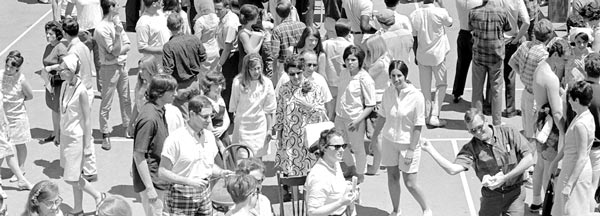Campus News
Reuniting and remembering
Pioneer student reunion brings together UC Santa Cruz’s original students for laughs, insights, and memories of the unique and intense educational experience of the campus’s first years

Exactly 50 years from the day they first arrived on campus and moved into temporary trailers on the East Field, 211 of UC Santa Cruz’s original students converged on campus.
The first-ever Pioneer Reunion took place Saturday in the East Field House, a place that everyone from the Class of ’69 remembers as a room of many purposes, from the serving of meals to the playing of sports and the teaching of Professor William Hitchcock’s legendary World Civilization classes. Though it was many years ago, returning graduates could still remember Hitchcock kicking things off by assigning the first reading: H.D. F. Kitto’s The Greeks, which inspired the classmates to give each other long and ridiculous “Homeric nicknames.”
Fifteen pioneer faculty also showed up, as did Peter Smith, founding chancellor Dean McHenry’s executive assistant; Smith traveled all the way from Buffalo, N.Y., to be there.
The returning Slugs were well into their 60s, but the reunion was so full of energy and political savvy, with hints of political activism and protest, that it could have just as easily been a group of engaged undergraduates. When pioneer Professor of Psychology and Sociology G. William Domhoff, an original faculty member, was addressing the crowd, someone loudly asked him what might be done about the American oligarchy.
Domhoff’s talk harkened back to the original incarnation of UC Santa Cruz, a university with a small-college format and no established traditions. He also reflected fondly about the inevitable tensions that can happen when faculty members urge the students to express themselves in the most authentic way possible, and then register their shock at the results.
“Dean McHenry was a liberal,” Domhoff said. “But as you all know, Dean was somewhat uptight. They told us to have our own ideas, and when we did, they told us they didn’t like them…. There were generational differences.”
Responding with creativity
Pioneer student Paul Rabwin remembered when he moved off campus to a four-room cabin in the now-exclusive Pasatiempo area and paid $40 a month for it.
He also expressed the thrill of coming to a new campus and writing one’s own future. “We were forced to intellectually create our own environment” from scratch, he said.
Rabwin approached founding Cowell College provost Page Smith and told him he’d like to form a musical group but didn’t know where to begin. He didn’t even have sheet music to distribute. Smith reached into his pocket, gave Rabwin $100, and told him to go forth and get the group going.
Rabwin then started the Cowell Madrigal Singers.
“Every one of us is overwhelmingly enthusiastic about the time we had here,” Rabwin said. “We all had our careers shaped by being forced into a situation where we had to respond with creativity.”
Photos and interviews
Smith left UC Santa Cruz in 1973 and died in 1995, but he watched over the proceedings with an admiring and wistful expression. Black and white photos of Smith—courtesy of pioneer student Eric Thiermann—were framed and mounted on folding chairs at the sides of the field house, one of them showing Smith riding a horse, another depicting him with a long rifle in his hands. The other snapshots were straight out of the radical late 1960s era of UC Santa Cruz life; several retirement-age people stood around, chuckling at a photo featuring nine clothed young men standing next to a woman wearing nothing but a broad-brimmed hat, earrings, and an inscrutable expression.
The pioneers had a unique mentorship opportunity: Each of them submitted to intensive interviews by current UC Santa Cruz students—a rare mingling of Slug generations. Michael Arighi, a ’69 Cowell graduate, urged the undergraduates to “Take all that is offered and embrace it with both arms. You will get things you don’t expect out of it. You don’t know if Path A is really where you’ll end up or not. I’m on Path D and it’s worked out for me very well.”
‘We were it’
Marjorie Rasmussen (Cowell ’69, U.S. history) loved the early freewheeling spirit of the place. “There was no one above us,” she said, referring to the original frosh on campus. “We didn’t have upperclassmen to tell us we were idiots. We were it.” She said the classes were quite challenging, “but the professors made it interesting. They engaged us, and made our opinions feel worthwhile.”
She also chuckled at way that students had to communicate with the outside world back then. The temporary trailers where the students first lived (because the dorms weren’t done yet) were arranged like the spokes of a wheel. In the middle of each “wagon wheel” formation stood a single and highly coveted phone booth. In those days before smartphones, young scholars would stare out their windows all the time to see if the phone was in use.
Reunion attendants read a loving and sometimes uproarious informal history of the Pioneer Class and the early campus, prepared by Judy Einzig (Cowell ’69, psychology). Her hand-out, on sky-blue paper, mentioned the mathematician and cellist who taught a Zen Buddhism class, and the social philosopher and humanities professor Norman O. Brown leading his class to the Quarry, then burning his famous book, Love’s Body, there.
Einzig summed it up in this fashion:
“Page Smith was our father. Dean McHenry was our grandfather. Clark Kerr (UC President at the time of UC Santa Cruz’s founding) was our godfather. And (William) Hitchcock was god.”